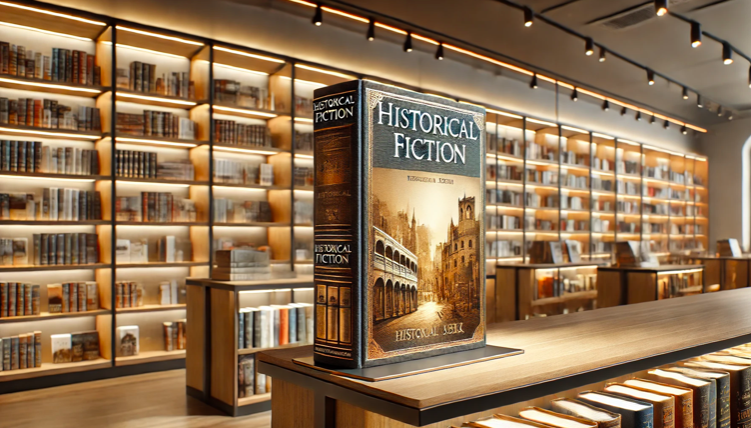Historical fiction publishing has experienced a dynamic evolution, blending rich narratives of the past with the ever-changing demands of the literary market. This genre, which brings history to life through meticulously researched stories and compelling characters, has captivated readers for decades. Today, historical fiction remains a significant segment of the literary industry, appealing to a diverse audience that spans various age groups and interests.
The market for historical fiction is robust, with both traditional publishing companies and independent publishers actively seeking captivating historical novels. Major publishing houses like Hachette Book Group and Penguin Random House continue to invest in this genre, recognizing its enduring appeal.
Additionally, the rise of self-publishing platforms has democratized access for authors, allowing more voices to contribute to the rich tapestry of historical storytelling. As we navigate the landscape of historical fiction publishing, it becomes clear that this genre not only preserves the past but also enriches our understanding of it.
Overview of Historical Fiction Publishing
Historical fiction has long been a beloved genre, with roots stretching back to classical literature. Early examples include Sir Walter Scott’s “Waverley” novels in the early 19th century, which set a precedent for blending historical events with fictional narratives. The genre continued to evolve, with authors like Alexandre Dumas and Leo Tolstoy contributing significant works that combined historical accuracy with engaging storytelling. Throughout the 20th century, historical fiction gained popularity, with authors such as Ken Follett and Hilary Mantel elevating the genre with their meticulous research and vivid portrayals of historical periods.
Current Trends
In the modern era, historical fiction remains a vital part of the literary landscape. Publishing companies, from large traditional publishers to independent presses, actively seek historical novels that offer fresh perspectives and diverse voices. There is a growing trend towards exploring underrepresented histories, including stories from non-Western cultures and marginalized communities.
Additionally, the popularity of historical romance and historical mysteries has expanded the genre’s appeal. The rise of digital publishing and self-publishing platforms has also democratized the market, allowing new and emerging authors to find their audience. Readers today are drawn to historical fiction for its ability to provide escapism, education, and a deeper understanding of the human experience across different eras. Historical fiction is also growing in the genre of short stories, especially in 2024.
Understanding Historical Fiction’s Appeal
Historical fiction is a genre that reconstructs past events and periods through imaginative storytelling. To qualify as historical fiction, a novel must be set in a time period significantly earlier than the author’s own, typically at least 50 years in the past. These stories often weave real historical figures, events, and settings with fictional characters and narratives.
Key characteristics include meticulous research, authentic detail, and a focus on historical accuracy while still providing a compelling plot. Popular subgenres within historical fiction include historical romance, mysteries, and adventure stories, each adding unique elements to the genre.
Target Audience
The appeal of historical fiction spans a wide range of readers. Demographically, the genre attracts a significant portion of adult readers, particularly those over the age of 30, with a notable following among both men and women. Psychographically, historical fiction readers often have a strong interest in history and culture, seeking to gain insights into different eras and experiences through engaging narratives.
They value well-researched and accurately depicted settings, as well as rich, complex characters. This audience tends to be well-educated, enjoying the intellectual stimulation and educational aspects that historical novels provide. They appreciate the genre’s ability to transport them to different times and places, offering both escapism and a deeper understanding of the past.
The Role of Historical Novels in the Literary World
Historical novels play a crucial role in the realm of literary fiction by bridging the gap between past and present. They provide readers with a vivid portrayal of different eras, fostering a deeper understanding of history and its impact on contemporary society. These novels offer not just entertainment but also education, allowing readers to experience historical events and cultures firsthand. The meticulous research and rich storytelling inherent in historical fiction elevate it to a respected position within literary circles.
Notable Works and Authors
Several historical novels have left an indelible mark on the literary world. Hilary Mantel’s “Wolf Hall” and its sequels brought the Tudor period to life with unparalleled depth and accuracy. Ken Follett’s “The Pillars of the Earth” captivated readers with its epic tale of medieval England.
Additionally, Hilary Green’s novels, known for their engaging narratives and historical fidelity, continue to enrich the genre. These works exemplify the power of historical fiction to transport readers to different times and places, making significant contributions to both literature and our understanding of history.
Historical Research and Accuracy
Historical research is fundamental to crafting authentic and engaging historical fiction. Ensuring historical accuracy not only enriches the narrative but also builds credibility and trust with readers who value precision in depicting past events. Accurate details about the era, including customs, language, and social norms, are crucial for immersing readers in the story.
Resources and Techniques
Effective historical research involves using a variety of resources and techniques. Primary sources, such as letters, diaries, and official documents, provide firsthand insights into historical periods. Secondary sources, including scholarly articles and history books, offer critical analyses and context.
Visiting historical sites and museums can also inspire vivid descriptions and enhance authenticity. Utilizing online databases and digital archives allows for convenient access to a wealth of information. Collaborating with historians or experts can further ensure accuracy. Keeping meticulous notes and cross-referencing facts are best practices that help maintain the integrity of historical narratives.
Literary Agents and Historical Fiction
Literary agents play a pivotal role in the journey of getting historical fiction published. They serve as intermediaries between authors and publishing houses, leveraging their industry knowledge and connections to secure publishing deals. Agents help refine manuscripts, craft compelling query letters, submit them, and negotiate contracts, ensuring that authors receive the best possible terms. Their expertise in market trends and editor preferences increases the chances of a manuscript being accepted by a publisher.
Finding the Right Agent
Selecting the right literary agent is crucial for authors of historical fiction. Research is key: authors should seek agents who have a proven track record of representing historical fiction and a deep understanding of the genre. Resources like literary agency websites, industry publications, and conferences can provide valuable insights. Personalized query letters that highlight the unique aspects of the manuscript and why it aligns with the agent’s interests are essential. Building a relationship with an agent who is passionate about historical fiction can significantly enhance an author’s career.
Major Publishing Companies and Historical Fiction
Several major publishing companies dominate the landscape of historical fiction, offering extensive resources and broad market reach. Hachette Book Group and Penguin Random House are two of the most prominent players in this field. Hachette Book Group, known for its diverse range of titles and robust distribution network, publishes numerous acclaimed historical novels each year. Penguin Random House, the largest trade publisher worldwide, has a rich history of bringing best-selling and award-winning historical fiction to readers globally.
Publishing Imprints
Within these major companies, specialized imprints focus on historical fiction, ensuring targeted editorial expertise and book advertising services. For instance, Hachette’s imprint, Grand Central Publishing, has a strong portfolio of historical fiction titles. Penguin Random House boasts imprints like Ballantine Books and Viking Press, both of which have a long-standing tradition of publishing esteemed historical novels. These imprints are dedicated to nurturing historical fiction, from meticulously editing manuscripts to crafting compelling marketing campaigns.
These industry leaders and their specialized imprints play a crucial role in shaping the historical fiction market, continuously bringing new and diverse stories to readers. Their commitment to the genre ensures that historical fiction remains a vibrant and significant part of the literary world.
Independent Publishers and Self-Publishing
Independent Publishers
Independent publishers, or small publishers, offer unique advantages and challenges for authors of historical fiction. One significant benefit is the personalized attention and editorial support they provide, which can lead to a more collaborative and nurturing publishing experience. Independent publishers are often more willing to take risks on unconventional or niche stories, providing opportunities for diverse voices and innovative narratives.
However, working with small publishers can present challenges, such as limited marketing and print, budgets and distribution networks. Authors might find that their books have less visibility in the market compared to those published by larger companies. Despite these challenges, independent publishers can offer a closer, more engaged relationship with authors, fostering a strong creative partnership.
Self-Publishing
Self-publishing has emerged as a viable option for many historical fiction authors. One of the primary advantages is the higher royalty rate, as authors retain a larger share of the profits from their book sales. Self-publishing also allows for complete creative control, from content to cover design, and the freedom to publish on the author’s schedule. However, self-publishing requires authors to handle all aspects of the publishing process, including editing, marketing, and distribution.
Publishing With Spines
Spines is a dynamic publishing platform designed to empower authors. With a blend of human expertise and advanced technology, Spines offers self-publishing authors a comprehensive suite of tools and services to support every step of the publishing journey, from manuscript editing and cover design to marketing and distribution. Spines stands out for its user-friendly platform and robust support system, helping authors navigate the complexities of both independent and self-publishing.
With its focus on fostering creative freedom and providing extensive resources, Spines has become a valuable ally for authors seeking to bring their narratives to a global audience.
Marketing Historical Fiction
Effective marketing techniques for historical fiction involve a strategic blend of traditional and digital approaches tailored to highlight the unique aspects of the genre.
Strategies
Social media platforms, particularly Instagram, Facebook, and Twitter, are invaluable for creating engaging content. Sharing historical facts related to the novel’s setting, character insights, and behind-the-scenes looks at the research process can captivate potential readers.
Creating visually appealing book trailers and hosting live author Q&A sessions can also generate interest and buzz around the book. Additionally, virtual book tours and webinars allow authors to reach a global audience, transcending geographical limitations.
Collaborations with book bloggers and influencers who specialize in historical fiction are essential. Their reviews and endorsements can significantly boost a book’s visibility and credibility.
Traditional media outlets, such as literary magazines and historical journals, also offer valuable platforms for promoting historical novels through interviews, excerpts, and reviews.
Targeting the Audience
Historical fiction readers are typically drawn to rich, detailed storytelling and appreciate historical accuracy and authenticity. Marketing efforts should emphasize these qualities, highlighting the novel’s meticulous research and unique perspectives on historical events.
Engaging with readers through book clubs, library events, and literary festivals can foster a sense of community and encourage word-of-mouth promotion.
Offering exclusive content, such as early access to chapters, special editions, or signed copies, can incentivize readers to purchase the book.
Additionally, creating a compelling author website with a dedicated blog can keep readers informed and engaged, providing regular updates and insights into the writing process and historical background of the novel.
Navigating the Historical Fiction Market in 2024
Navigating the historical fiction market in 2024 requires a keen understanding of current trends and a proactive approach to publishing and book marketing services. Firstly, staying abreast of popular themes and underrepresented histories is crucial. Stories focusing on diverse perspectives, such as those from marginalized communities or lesser-known historical events, among other genres are gaining traction.
Authors should consider leveraging self-publishing platforms and independent publishers, which continue to grow in popularity due to their flexibility and higher royalty rates. Building a robust online presence through social media and personal websites is essential for connecting with readers and promoting new releases.
Networking remains vital; attending literary festivals, and writers’ conferences, and joining historical fiction writing groups can provide valuable industry insights and connections. Engaging with readers through virtual book clubs and online forums can also enhance visibility and foster a loyal readership.
Finally, securing a knowledgeable literary agent with a strong track record in historical fiction can significantly boost an author’s chances of landing a lucrative publishing deal, ensuring their work reaches a broad audience in the competitive 2024 market.
The Future of Historical Fiction Publishing
Historical fiction publishing remains a vibrant and evolving segment of the literary industry. It thrives on meticulous research, captivating storytelling, and a deep connection to the past. Authors benefit from both traditional and self-publishing avenues, while marketing strategies increasingly leverage digital tools and community engagement to reach dedicated readers.
Looking ahead, the future of historical fiction publishing is promising, with an increasing emphasis on diverse voices and underrepresented histories. As the literary landscape continues to evolve, historical fiction will undoubtedly adapt and flourish, continuing to offer readers a rich tapestry of stories that bridge the past and present.








